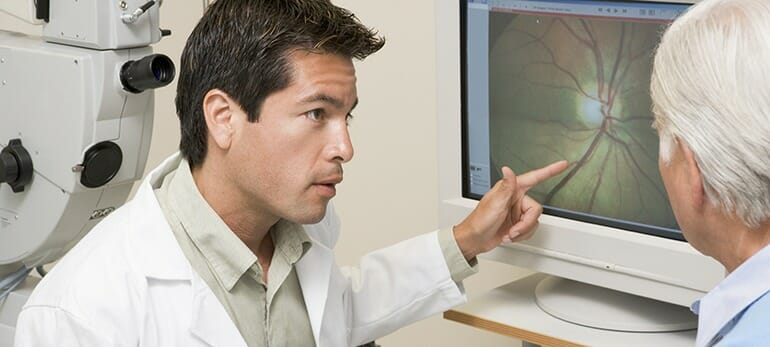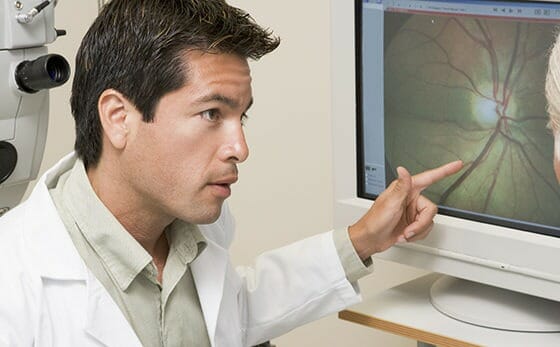Getting Older? Mind Your Eyes…

Aging often brings wonderful benefits like fewer responsibilities where kids and work are concerned, but it can also have its share of challenges, such as health issues that need to be constantly monitored. If you’re entering your golden years, or are already in them, or you’re caring for an elderly person, then you’ll want to make sure you stay on top of your eye health so you can see well for years to come.
We’ve put together 7 things you need to know about eye care for aging adults, so that you have a good chance of continuing to see the beauty in the world throughout your carefree years.
1 There Are Specialized Doctors for Aging Eyes
As you get older, it may not be in your best interest to keep going the optometrist you saw even 5 years ago. Eye doctors who specialize in aging eyes have an important role in keeping your vision in the best shape possible, despite the fact that you’re not as young as you once were.
Eye specialists who treat aging adults are knowledgeable about conditions that affect the older population, and they tend to have more patience and empathy with elderly patients. Older individuals often have a lot of questions about the changes their eyes are going through, and they sometimes have fears.
When it’s time to discuss care and treatment for aging eyes, make sure you have a specialized eye care practitioner who’s trained to help you with exactly the challenges you’re going through.
2 You Need Regular Eye Exams
After age 40, vision typically starts to change, and sometimes, it transforms quite rapidly. Maybe you now need glasses to see far or close, when you didn’t before. Perhaps you have trouble seeing some colors, or adjusting your vision when there’s glare.
These vision problems are common, but sometimes they are symptoms of an underlying condition that needs to be checked out right away. When you’re getting up in age, you should get a comprehensive eye exam at least once a year. In order to continue to enjoy experiencing the fullness of life into late adulthood, make sure you get a dilated eye exam annually to test for age-related macular degeneration, diabetic eye disease, low vision and dry eyes, cataracts, glaucoma, and other illness that can lead to severe vision loss if left unchecked.
3 Proper Nutrition Makes for Healthy Eyes
You’ve probably heard throughout your life that eating carrots leads to good eyesight. It’s true. The vitamin A in carrots, and other nutrients in plants, contributes to good eyesight. As some people age, they start to think they don’t have to worry so much about what they eat. If you want to have eyes that help you see well tomorrow and for years to come, you need to keep eating healthily.
Age-related eye diseases like cataracts and macular degeneration can be delayed or avoided by proper nutrition. In addition to consuming foods that have eye-healthy properties, you may ward off diabetes with a good diet. Diabetes increases your risk of age-related eye diseases and conditions like diabetic retinopathy.
Continue to eat healthy foods that will protect your eyes, such as colorful fruits and vegetables. In particular, turn to dark leafy green foods, orange fruits and veggies, and dark red berries. These are all foods that have an abundance of eye-healthy compounds like antioxidants.
4 Aging Eyes Are Prone to Disease and Illness
When a body ages, it naturally becomes prone to diseases and debilitating conditions. You can avoid some of these, or lessen the impact they have on your lifestyle, when you know about them and see your eye doctor the minute you suspect their onset.
One of the more common age-related eye conditions and illness is Age-related macular degeneration (AMD), a disease that slowly destroys clear central vision. You need sharp central vision to see object details and to perform everyday tasks like driving and reading. Cataracts are another eye disease that affects aging adults.
A cataract is characterized by a clouding of the eye lens, as vision becomes blurry or cloudy when a cataract is present. Colors may appear faded, and there may be quite a bit of glare in your eyes. If you are diabetic, you’ll want to notify your eye care professional of any vision complications you experience. Diabetic eye disease occurs when diabetes damages the small blood vessels inside of the retina, which can lead to blindness.
5 You May Experience Common Eye Problems
A few common eye problems you might face when you age can be irritating at worst, but sometimes eye issues may be signs of serious problems. Talk to your eye doctor if you notice a gradual loss of ability to see small print or close objects (presbyopia), little specks that seem to flat across your eyes (floaters), or excessive tearing that comes about by sensitivity to temperature change, wind, or light.
These challenges could be nothing serious, but they could be symptoms of other health problems.
6 Low Vision Is Common
Sometimes, no matter how well you eat or how many eye exams you get, you may experience low vision. This is common, and the best way to deal with it after you and your doctor have ruled out serious illness is to adjust your lifestyle.
Small changes can prevent lowered vision from keeping you away from the things you love. If you can’t see well enough to cook, make out friends’ and family members’ faces, or sew, then be sure to ask your doctor for glasses that will help you enjoy these activities. For those of you who may have difficulty watching TV or working on the computer, consider helper technology like closed-circuit televisions, text-to-talk software, or audio tapes.
7 There Are Tips to Protect Your Eyesight
A few additional tips we recommend to protect your eyesight as you age include wearing brimmed hats and sunglasses, not straining your eyes by watching TV for extended periods of time, exercising regularly to promote healthy blood circulation, and getting enough sleep so that your eyes can rest and become re-lubricated for a new day.
These are just some of the things you need to know about eye care for aging adults. So that you’re prepared for anything your eyes will experience as you age, schedule a comprehensive eye exam with one of our specialized optometrists.
[Photo Via: AOA.org]

